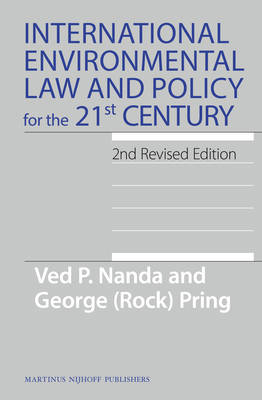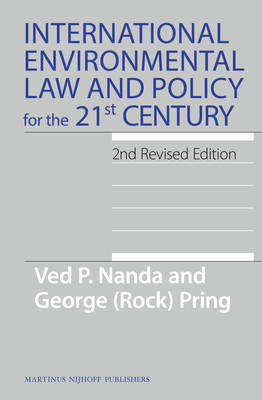
- Retrait gratuit dans votre magasin Club
- 7.000.000 titres dans notre catalogue
- Payer en toute sécurité
- Toujours un magasin près de chez vous
- Retrait gratuit dans votre magasin Club
- 7.000.0000 titres dans notre catalogue
- Payer en toute sécurité
- Toujours un magasin près de chez vous
Description
In the 21st century, anthropogenic (human-caused) environmental change is widespread and serious on the global, regional/transboundary, and local levels. Emphasizing the environmental, social, and human damage caused by non-sustainable development, International Environmental Law and Policy for the 21st Century, Second Revised Edition by Nanda and Pring, provides readers with an incisive and integrated approach to the political, economic, scientific, and technological realities and challenges facing international environmental law and policy today. This provocative new book offers innovative chapters on such crucial current imperatives as:
- the nature and scope of the challenge;
- first principles of international environmental law;
- environment and human rights;
- environment and the nexus of international trade, finance and debt; and
- the unfinished agenda.
Traditional subjects covered include the history of international environmental law, the law of the sea, international freshwater resources, cross-border air pollution, ozone depletion and climate change, the technology of chemicals manufacture and transport, disposal of hazardous waste, preservation ofand biodiversity, environmental impact analysis, and regulation of nuclear energy. The book also features a critical examination of the UN's activities on the environment, starting from the 1972 Stockholm Convention on the Environment, up to and including the 2012 Rio+20 Conference on Sustainable Development.
With new chapters devoted to critical energy and population issues, and a new section on corporate social responsibility, International Environmental Law & Policy for the 21st Century is an essential resource for students, scholars, lawyers, public officials, corporate decision-makers, and technical consultants concerned with environmental issues.
- the nature and scope of the challenge;
- first principles of international environmental law;
- environment and human rights;
- environment and the nexus of international trade, finance and debt; and
- the unfinished agenda.
Traditional subjects covered include the history of international environmental law, the law of the sea, international freshwater resources, cross-border air pollution, ozone depletion and climate change, the technology of chemicals manufacture and transport, disposal of hazardous waste, preservation ofand biodiversity, environmental impact analysis, and regulation of nuclear energy. The book also features a critical examination of the UN's activities on the environment, starting from the 1972 Stockholm Convention on the Environment, up to and including the 2012 Rio+20 Conference on Sustainable Development.
With new chapters devoted to critical energy and population issues, and a new section on corporate social responsibility, International Environmental Law & Policy for the 21st Century is an essential resource for students, scholars, lawyers, public officials, corporate decision-makers, and technical consultants concerned with environmental issues.
Spécifications
Parties prenantes
- Auteur(s) :
- Editeur:
Contenu
- Nombre de pages :
- 684
- Langue:
- Anglais
- Collection :
- Tome:
- n° 9
Caractéristiques
- EAN:
- 9789004242869
- Date de parution :
- 12-10-12
- Format:
- Livre relié
- Format numérique:
- Genaaid
- Dimensions :
- 155 mm x 235 mm
- Poids :
- 1133 g

Les avis
Nous publions uniquement les avis qui respectent les conditions requises. Consultez nos conditions pour les avis.






